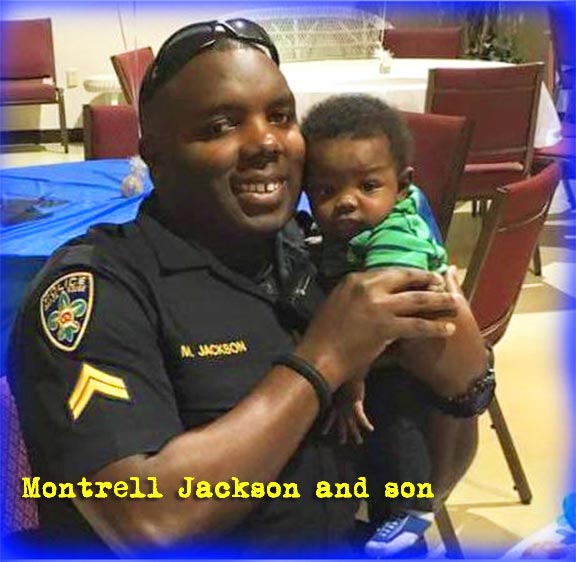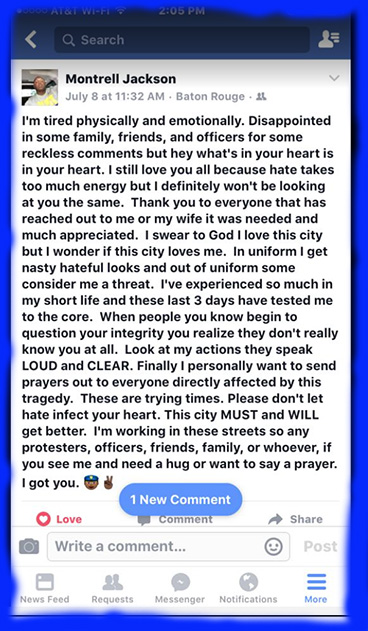The LA County sheriff’s deputy union ALADS, struck a good note with its statement on Sunday evening about the horrific Baton Rouge shooting that claimed the life of three law enforcement officers, and injured three more:
“We join in solidarity with law enforcement officials and agencies throughout our country in condemning in the strongest possible terms the attack on peace officers in Baton Rouge this morning,” the ALADS board wrote. “While we do not yet know, let alone begin to understand the circumstances surrounding the killing and wounding of these police officers, we know that violence directed at the very men and women sworn to uphold the rule of law undermines our society and threatens our freedom. The time is now for America to pull together to find solutions to these senseless assaults on law enforcement.
The message is simple. It condemns what must be condemned and is full-hearted in its support of law enforcement. But the message is also devoid of the divisiveness and demonization that—on both sides—too often poisons a discussion that daily seems to be growing more necessary, not less.
Then the ALADS board went one step further, at the end of its formal statement by pointing to the emotional and heart-piercing Facebook post written by Baton Rouge police officer Montrell Jackson a few days before he was killed.
Marcus Tillman, a former Baton Rouge police officer who was a good friend of Jackson’s and reportedly partnered with him for a short period, grieved for his law enforcement brother on Facebook when he got the terrible news that Jackson was one of the three officers killed by a rogue gunman in black fatigues now identified as Gavin Long, 29, of Kansas City, Missouri.
“Rest in Peace to my former partner and one of the best cops I’ve ever known...” Tillman, wrote on Facebook during the day on Sunday. “His name was Montrell Jackson! His call number was 3519! And he was a black life that apparently didn’t matter to the one that took it!”
Then eight hours later, around 10 p.m. Tillman wrote another post:
Unless you’ve been there, you can’t possibly understand why at a time like this all I want to do is gear up and go right back out into the streets to protect and serve. Evil may expose the weakness of men, but it will not make The Light cower!”
Montrell Jackson expressed in the clearest possible terms his commitment to walking on the side of light, even though he was getting slammed both as a police officer and a black man. So did Matthew Gerald and Brad Garafola when, after an exhausting week, they went back to work, and responded unhesitatingly when the B-Quick call came, as did the five Dallas officers who protected their fellow Texans who had come to peacefully protest, although it cost them everything.
Surely, we honor them best by staying in the light ourselves as we talk to each other, even when we disagree, even when we wish to do otherwise.



Heather MacDonald’s article at City Journal (http://www.city-journal.org/html/fire-spreads-14652.html) challenges the moral equivalency argument that vocal defenders of law enforcement and the anti-police promoters share proportionate blame for the problem of violence. Concluding paragraph:
“It may be too late to stop this fire from spreading. But Obama has one more chance to try to put it out. He failed that opportunity in his remarks hours after the Baton Rouge carnage, delivering instead an anodyne call to heal “our divisions” and discard “inflammatory rhetoric thrown around to advance an agenda.” Implication: Blame for “inflammatory rhetoric” is equally shared by those who attack cops and those who defend them. Sorry, Mr. President, those who tell the truth about crime and policing are not part of the problem and they bear no responsibility for the massacre of cops. The killing of cops is furthered exclusively by those peddling a false narrative that cops harbor lethal bias toward blacks. Obama should call for the Black Lives Matter movement to fold its tent—and he himself should start telling the truth about inner-city crime.”
Seems a reasonable conclusion.
Celeste, well said in your last two paragraphs. Thanks.